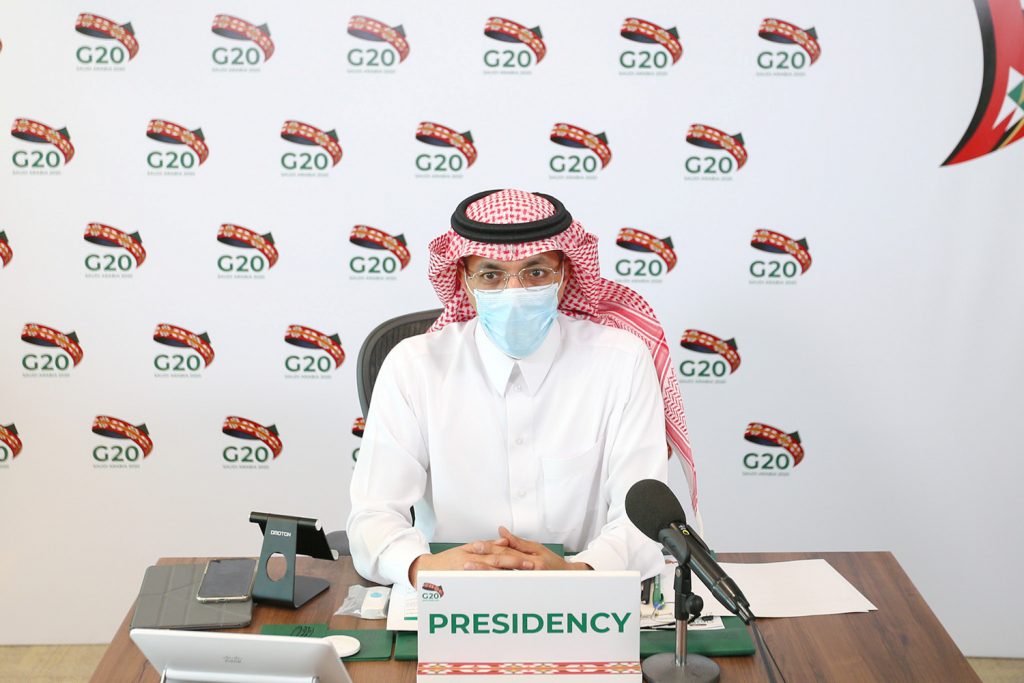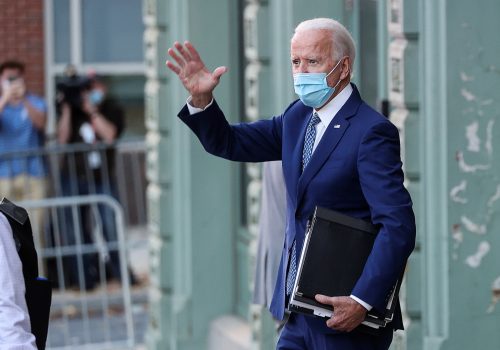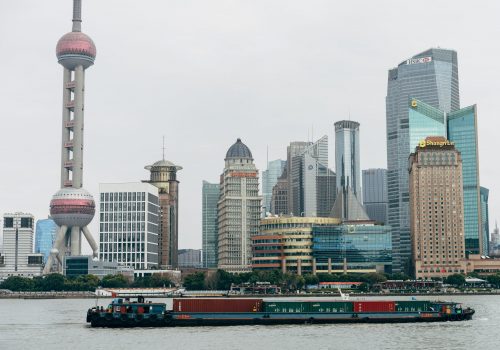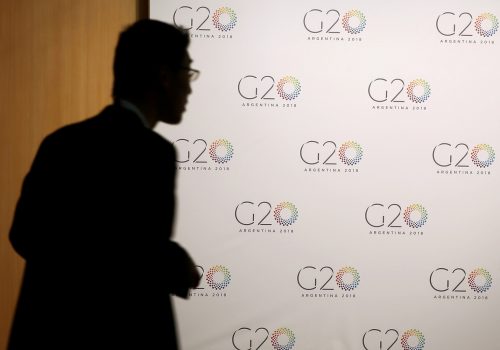As the pandemic-induced global recession continues to batter African economies, the Group of Twenty (G20) governments have sidestepped the pressing need for assistance to countries hardest hit by the downturn. Instead, they have focused on aligning their interests in preparation for the next stage of the region’s deepening crisis: the restructuring of unsustainable debt burdens.
That is the inescapable conclusion of last week’s special meeting of G20 finance ministers, which laid the groundwork for the November 21 – 22 gathering of the group’s leaders. As Zambia defaulted on a $42.5 million payment to Eurobond holders and other African governments grappled with a funding shortfall estimated by the International Monetary Fund (IMF) at $130 billion this year, the G20 hammered out a “Common Framework for Debt Treatments” targeted largely at China, the region’s largest bilateral creditor. But the framework’s focus on debt restructuring also served as a rebuke to the group’s eight-month attempt to encourage a debt-service standstill for seventy-three low-income countries, an effort that has fallen short of its intent largely because of the failure to induce the participation of private sector lenders.
Officials from G20 governments, international institutions, and private sector lenders lauded the framework agreement for bringing China’s approach to debt issues closer to the purposes and methods of the Paris Club, the grouping of advanced economy sovereign lenders that engages on debt restructuring. They insisted that it will enable the Chinese government to better coordinate among its more than thirty lenders in Africa and thus make Beijing’s interactions with borrowers and other lenders more transparent. While this may encourage more cooperation in the long run, there is skepticism that China is prepared to act in line with those expectations at the moment—witness the current standoff over Zambian debt where China’s two major lenders are unilaterally striking debt-standstill agreements laden with non-disclosure clauses that leave angry bondholders in the dark.
Meanwhile, private sector lenders also obtained a concession in the form of the accord’s acknowledgment that debt restructuring may be required on a “case-by-case basis.” Their response to the G20’s blanket debt-service relief has been an insistence that every country’s economic circumstances be addressed individually. Bondholders and major international banks hold a significant portion of Africa’s external debt and have resisted the debt-relief effort out of concern for the implications for their fiduciary responsibilities, especially with credit-rating agencies threatening to downgrade sovereign ratings at the first sign of a delayed payment or default. Many debtor countries with private sector loans steered clear of the G20 debt-relief program for the same reason. The G20 debt framework calls for private creditors to be ensured treatment “at least as favorable as that provided by official bilateral creditors.”
Subscribe to Fast Thinking email alerts
Sign up to receive rapid insight in your inbox from Atlantic Council experts on global events as they unfold.

There is a strong argument for the creditor governments to directly engage with the private sector. While the bondholders are a disparate group with informal steering committees, the banks are a more manageable constituency. Bank transparency is critical because the full extent of international bank exposure to Africa should not become a subject of speculation—in essence, the same argument being made about Chinese lenders. There was a failed attempt in 2018 to require international banks to disclose their exposure to Africa, following concerns about debt sustainability, through the Transparent Lending Covenant (which acquired the awkward acronym TLC). The covenant did not gain traction due to banks’ objections about having to disclose proprietary information.
Perhaps it is time for G20 regulators to add some muscle by requiring the big banks to disclose their Africa loan portfolios and also to demonstrate their long-term commitment by increasing their exposure and coming up with innovative financial solutions. For example, commodity prices are currently in the doldrums, but international banks can help resource-rich countries with securitization solutions.
The syndicated loans put the banks in a particularly difficult position as indebted countries move toward restructuring. Unlike the collective action clauses attached to many Eurobond issues, which call for only majority approval of proposed debt workouts, the syndicated loans require 100 percent approval of participating institutions. Bankers say that the G20’s endorsement of case-by-case negotiations gives lenders greater assurance of a process that can gain support from all institutions. But that process also means that indebted countries cannot expect relief from their debt burdens in the short run.
It also means that the debtor nations will be expected to negotiate IMF programs before—or concurrent with—discussions with private sector creditors. Since the pandemic erupted, many of the hardest hit African countries have received rapid-disbursement IMF loans with limited conditionality (and some IMF debt relief), but the private sector may expect more iron-clad Fund financial arrangements before agreeing to debt restructuring. Officials say that the G20 debt framework is based on the expectation of a central IMF role in the process. The first case where that involvement will likely become necessary is Zambia, which has tried to avoid an IMF program for several years even as it has fallen into debt distress.
The Institute of International Finance, a Washington, DC-based association that represents major international banks, has recently added its voice to calls for IMF member governments to approve a special issue of IMF special drawing rights (SDR), an IMF reserve asset exchangeable for hard currency. This proposal has been informally endorsed by a major portion of the IMF membership, but is opposed by the Trump administration even as the current G20 chair, Saudi Arabia, has pushed for approval. The process of SDR conversion has previously proven to be complex, so any support for poor countries would not be a given.
So, in the relatively brief span of eight months since the recession hit, the G20 has moved from the high hopes of a debt-service moratorium (which it has extended through June 2021) that did not deliver significant relief to a framework for restructuring debt. That construct specifically states that “debt treatments will not be conducted in the form of debt write-off or cancellation,” a reflection of creditors’ resistance to any discussion of a debt reduction program along the lines of the Heavily Indebted Poor Countries initiative that sharply reduced sovereign debt burdens early in this century. However, one can only wonder where Africa will be in another eight months if the global downturn becomes deeper and more prolonged. Will the G20 debt framework just become another way station on the road to another multilateral debt relief initiative?
Vasuki Shastry, formerly with the IMF and Standard Chartered Bank, is an associate fellow at Chatham House and author of “Resurgent Indonesia – From Crisis to Confidence.” Follow him on Twitter @vshastry.
Jeremy Mark was a senior communications adviser and speechwriter to the IMF management team and previously an award-winning reporter for The Asian Wall Street Journal. Follow him on Twitter @jedmark888.
Further reading:
Image: Saudi Minister of Finance Mohammed al-Jadaan wears a protective mask as he attends a virtual meeting of G20 finance ministers and central bank governors in Riyadh, Saudi Arabia July 18, 2020. G20 Saudi Arabia/Handout via REUTERS



